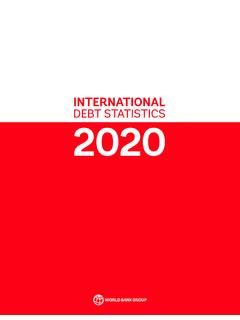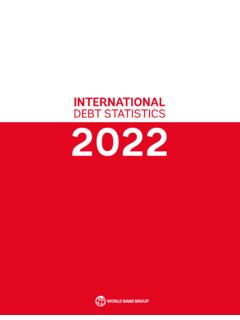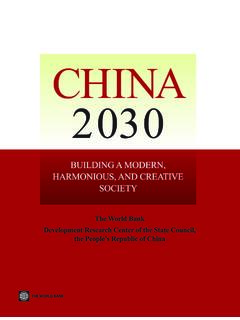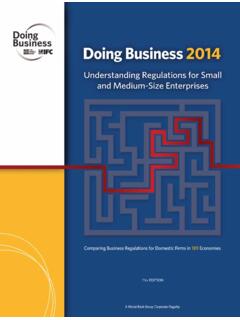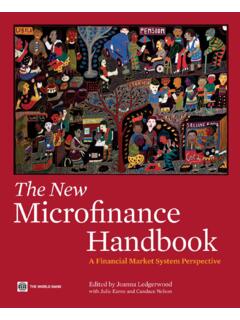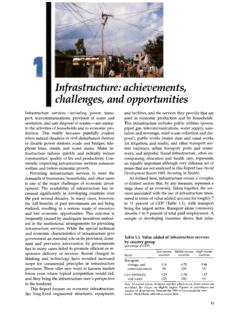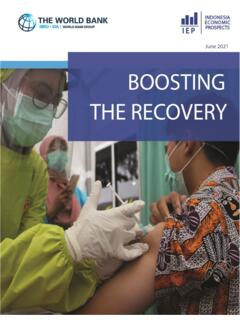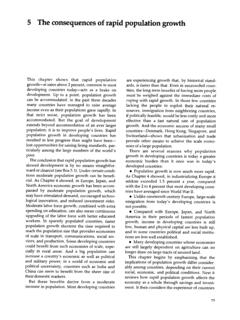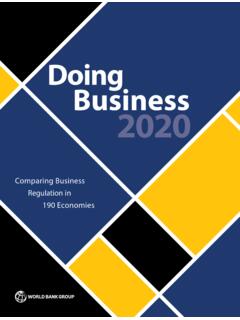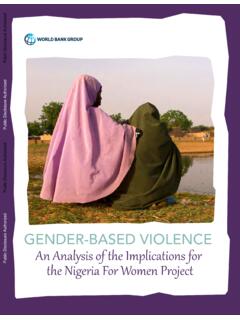Transcription of What is the Logistics Performance Index ... - World Bank
1 ConnectingtoCompete2018 Trade Logistics in the Global EconomyThe Logistics Performance Index and Its IndicatorsWhat is the Logistics Performance Index ?Based on a worldwide survey of global freight forwarders and express carriers, the Logistics Performance Index is a benchmarking tool developed by the World bank that measures Performance along the Logistics supply chain within a country. Allowing for comparisons across 167 countries, the Index can help countries identify challenges and opportunities and improve their Logistics Performance . The World bank conducts the survey every two Logistics is indispensable to integrate global value chains and reap the benefit of trade opportunities for growth and poverty reduction. The ability to connect to the global Logistics web depends on a country s infrastructure, service markets, and trade processes. Government and the private sector in many developing countries should improve these areas or face the large and growing costs of is the sixth edition of Connecting to Compete, a report summarizing the findings from the new dataset for the Logistics Performance Index (LPI) and its component indicators.
2 The 2018 LPI also provides expanded data on supply chain Performance and constraints in more than 100 countries, including information on time, distance and reliability, and ratings on domestic infrastructure quality, services, and border agencies. The 2018 LPI encapsulates the firsthand knowledge of movers of international trade. This information is relevant for policymakers and the private sector seeking to identify reform priorities for soft and hard trade and Logistics infrastructure. Findings include: Gaps in Logistics Performance between the bottom and top performers persist. Supply chain reliability and service quality are strongly associated with Logistics Performance . Infrastructure and trade facilitation initiatives still play an important role in assuring basic connectivity and access to gateways for most developing countries. The Logistics policy agenda continues to broaden, with growing focus on supply chain resilience, cyber security, environmental sustainability, and skills score, 2012 18(1 is the lowest score.)
3 5 is the highest score)Connecting to Compete 2018 Trade Logistics in the Global EconomyThe Logistics Performance Index and Its IndicatorsJean-Fran ois Arvis The World BankLauri Ojala Turku School of Economics, University of TurkuChristina Wiederer The World BankBen Shepherd Developing Trade ConsultantsAnasuya Raj The World BankKarlygash Dairabayeva The World BankTuomas Kiiski Turku School of Economics, University of Turku 2018 The International bank for Reconstruction and Development/The World Bank1818 H Street NWWashington, DC 20433 Telephone: 202 473 1000 Internet: : rights reservedThe findings, interpretations, and conclusions expressed herein are those of the authors and do not necessarily reflect the views of the Executive Directors of the International bank for Reconstruc-tion and Development/The World bank or the governments they World bank does not guarantee the accuracy of the data included in this work. The boundar-ies, colors, denominations, and other information shown on any map in this work do not imply any judgment on the part of The World bank concerning the legal status of any territory or the endorse-ment or acceptance of such and PermissionsThe material in this publication is copyrighted.
4 Copying and/or transmitting portions or all of this work without permission may be a violation of applicable law. The International bank for Reconstruction and Development/The World bank encourages dissemination of its work and will normally grant permission to reproduce portions of the work permission to photocopy or reprint any part of this work, please send a request with complete information to the Copyright Clearance Center Inc., 222 Rosewood Drive, Danvers, MA 01923, USA; telephone: 978 750 8400; fax: 978 750 4470; Internet: other queries on rights and licenses, including subsidiary rights, should be addressed to the Office of the Publisher, The World bank , 1818 H Street NW, Washington, DC 20433, USA; fax: 202 522 2422; e-mail: you have any questions or comments about this report, please contact:Global Trade and Regional Integration UnitThe World bank Group1818 H Street NW, Mailstop MC3-300, Washington, DC 20433 USAE-mail: site: , , or report was designed, edited, and typeset by Communications Development Incorporated, Washington, DC.
5 CONNECTING TO COMPETE 2018 TRADE Logistics IN THE GLOBAL ECONOMY iiiForewordCaroline Freund, Director, Macroeconomics, Trade and Investment Global Practice, The World bank GroupJos Luis Irigoyen, Senior Director, Transport and Digital Development Global Practice, The World bank GroupWe are happy to present the sixth edition of Connecting to Compete and the 2018 edition of the Logistics Performance Index (LPI). This interdisciplinary World bank project was launched just over 10 years ago. The ambition was to develop simple comparators of how effi-ciently supply chains connect firms to markets, or Logistics 2007, most of the countries the World bank Group works with are well aware of the importance of Logistics Performance for growth and integration. The cross- cutting na-ture of Logistics as a policy area is widely rec-ognized: Logistics is not just about connecting infrastructure but encompasses regulation of services, sustainability, and resilience, or trade see that this regular publication has had a significant impact in helping countries frame their own policies and motivate consistent ap-proaches to interventions and reforms at the national level.
6 In some cases, the World bank has been asked to provide support, which we did by bringing expertise and tools that address the country-specific supply chain constraints more deeply than the rough indications from the LPI can. The LPI remains unique in providing a common referential across exercise may seem a bit repetitive. The list of best performers does not change very much over the course of two years. We invite the reader to look beyond country rankings and look at the nexus of themes and policies. The lo-gistics sector is changing fast, in terms of the nature of demand (for example, e-commerce), players, use of technology, new risks (cyberse-curity), and policy concerns. Professionals and countries are increasingly concerned with the environmental footprint and resilience of sup-ply hope this work will appeal to a broad and diverse audience: policy makers, practitio-ners, and researchers. We are confident readers will find this report and its data FreundDirectorMacroeconomics, Trade and Investment Global PracticeThe World bank GroupJos Luis IrigoyenSenior DirectorTransport and Digital Development Global PracticeThe World bank Group iv CONNECTING TO COMPETE 2018 TRADE Logistics IN THE GLOBAL ECONOMYL ogistics is an elevated priority for many mem-ber countries of the International Transport Forum.
7 Because facilitating trade and trans-port is at the core of stimulating economic development, several countries have developed comprehensive national Logistics strategies. Well- functioning domestic and international Logistics is a precondition of national competi-tiveness. And fact-based metrics can provide reliable benchmarks, assess policy impacts, and compare global advances in World bank Logistics Performance Index (LPI) is a unique benchmarking tool, providing the same measure for more than 160 countries. At the International Transport Forum, we use the LPI as the most important starting point of dialogue with our member countries on the drivers of Logistics Performance . The six components of the LPI customs, infra-structure, ease of arranging shipments, quality of Logistics services, timeliness, and tracking and tracing point to policy actions that can sup-port the improvement of each individual ele-ment.
8 International Transport Forum studies have examined the drivers of Logistics perfor-mance and assessed the development of national Logistics observatories in Chile, Mexico, Turkey, and more recently LPI is a crucial part of global efforts to better understand Logistics Performance in the context of increasingly complex supply chains. I am sure the 2018 edition of the LPI will be used extensively by governments, international organizations, private firms, and academia in ef-forts to improve Logistics the backbone of the global Tae KimSecretary-GeneralInternational Transport Forum at the Organisation for Economic Co-operation and DevelopmentForewordYoung Tae Kim, Secretary-General, International Transport Forum at the Organisation for Economic Co-operation and Development CONNECTING TO COMPETE 2018 TRADE Logistics IN THE GLOBAL ECONOMY vThis report was prepared by the World bank s Global Trade and Regional Integration Team in the Macroeconomics, Trade and Investment Global Practice, under the guidance of Car-los Felipe Jaramillo (Senior Director), Caro-line Freund (Director), and Jose Guilherme Reis (Practice Manager).
9 The project leaders were Jean-Fran ois Arvis (jarvis1@worldbank .org) and Christina Wiederer (cwiederer@worldbank .org). The other authors included Professor Lauri Ojala (Turku School of Eco-nomics, University of Turku; @utu .fi), Ben Shepherd (Principal, Developing Trade Consultants; ben@developing-trade .com), Anasuya Raj ( @gmail .com), Karlygash Dairabayeva (kdairabayeva@ ), and Tuomas Kiiski authors thank Michele Ruta and Luis Blancas, the peer reviewers of the report, and other colleagues at the World bank who pro-vided guidance and inputs to the 2018 edition, including Cordula Rastogi, Daniel Saslavsky, Fannie Delavelle, St phane Hallegatte, An-drew Burns, and In s Zabalbeitia Mugica. As in previous years, a team at Communications Development led by Bruce Ross-Larson designed, edited, and typeset the Logistics Performance Index (LPI) sur-vey would not have been possible without the support and participation of the International Federation of Freight Forwarders Associations ( ), especially of Marco Sorgetti, FIATA s former Director General, as well as Hans G nther Kersten, FIATA s current Direc-tor General.
10 National freight forwarding asso-ciations and a large group of small, medium, and large Logistics companies worldwide were instru-mental in disseminating the survey. The survey was designed with Finland s Turku School of Economics, University of Turku ( ), which has worked with the World bank to develop the concept since authors are also grateful to external colleagues for their support and contributions in reaching out to forwarding associations and providing inputs for the report, including Ruth Banomyong (Thammasat University, Thai-land), Tapio Naula (Oman Logistics Center), and Cesar Lavalle (ILOS Brazil). Daniel Cra-mer of designed, developed, and maintained the LPI survey and result websites under the guidance of the core team. Scott Johnson from the World bank Informa-tion Solutions Group helped the team distribute the sur authors thank the hundreds of employ-ees of freight forwarding and express carrier companies around the World who responded to the survey.
